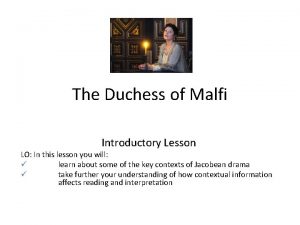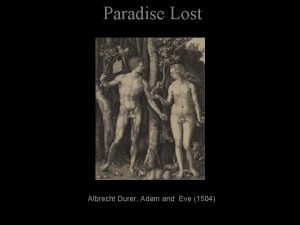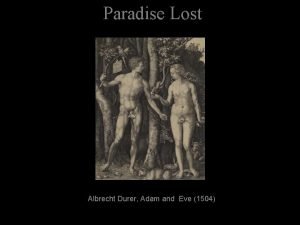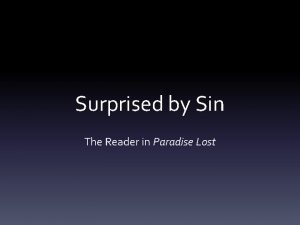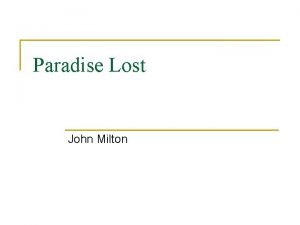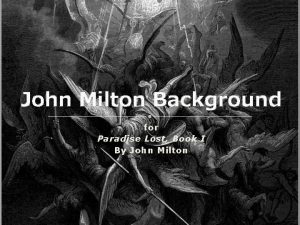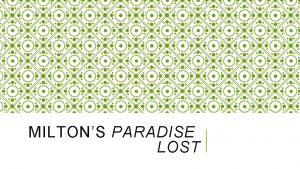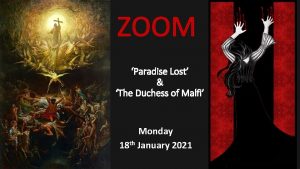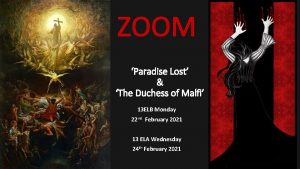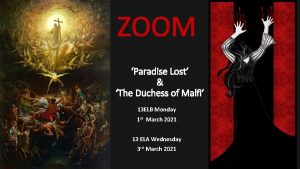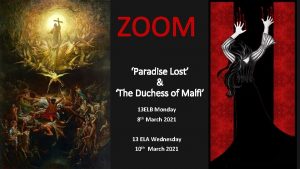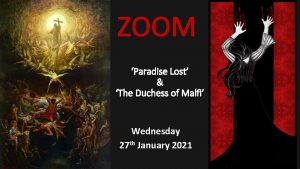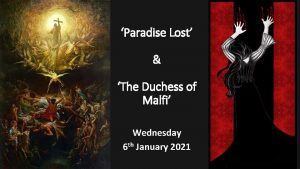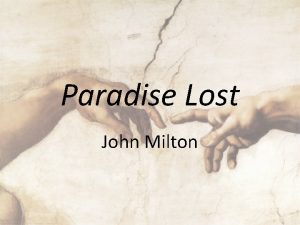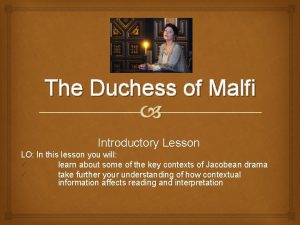ZOOM Paradise Lost The Duchess of Malfi Monday














![Satan and Bosola: Act 1 Scene 1 Lines 23 – 70 from [Enter Bosola] Satan and Bosola: Act 1 Scene 1 Lines 23 – 70 from [Enter Bosola]](https://slidetodoc.com/presentation_image_h2/2f78742ac0b72bc25cf0e6744af30595/image-15.jpg)

- Slides: 16

ZOOM ‘Paradise Lost’ & ‘The Duchess of Malfi’ Monday 25 th January 2021

Learning Purposes • Exploring theme of ‘ambition and its dangers’ • Recap – Satan in relation to theme • Contextual issues. • Explore the character of Bosola in relation to theme. Previous Learning: Exploring the presentation of the characters Eve, the Duchess and Satan in relation to theme of ‘Ambition and its Dangers’ Future Learning: Internal assessments in accordance with the examination syllabus.


Style of Question

Satan and Bosola Ambition and its Dangers Satan’s flawed means to ambition engender his decline: he is no longer the statesman and military leader of Books I and II, but a deconstructive consciousness, eaten up with envy and malice. Satan: Book 9 Lines 99 – 178 from ‘O earth, how like to heaven, if not preferred’ to ‘From dust: spite then with spite is best repaid’ Lines 473 – 512 from ‘Thoughts, wither have ye led me, with what sweet compulsion’ to ‘to interrupt, sidelong he works his way’ Book 10 Lines 383 – 584 from ‘whom thus the prince of darkness answered glad’ to ‘And Ops, ere yet Ditaean Jove was born. ’ Read through these lines exploring how Satan’s ambitions are expressed. What view of ambition is Milton giving? Identify and explain key quotations.

Context: Charles I, Oliver Cromwell, The English Civil War • His writings became increasingly political during the ‘eleven years of tyranny’, under Charles I, of 1629 -1640, and during the English Civil War (1642 -49). He was involved in the opposition to King Charles I, whom he perceived as a tyrant. Charles I was executed in 1649, and England entered its only period as a Republic (rule by parliament, without a monarch). • During Charles I trial, he wrote a highly controversial tract endorsing the revolutionary act of regicide (killing a king) in certain circumstances. This was a spectacular rejection of the Divine Right of Kings! Like the Puritans, Milton saw Charles as a usurper, and rejected the Divine Right theory. • For Milton, abolishing Kingship was a step back towards the original freedom of Adam – a chance to be obedient to God, our true master, rather than a tyrannical King. Adam’s freedom to Fall was evidence of his freedom: “all men naturally were born free, being the image and resemblance of God himself”.

• The civil war saw the Parliamentarians and their New Model Army, many of whom were deeply Puritan in their outlook, fighting the Cavaliers or Royalist supporters of Charles I. • The Puritan belief, shared by Milton, was that no man is another’s superior – that all forms of authority other than God’s are therefore suspect. • Oliver Cromwell, ruler of Republican Britain, was as unwilling to share power with parliament as Charles I had been, and proved himself a similar tyrant. On his death, disaffected MPs asked Charles I’s son, Charles II, to take throne. • Milton was very disappointed at the return to monarchy, feeling the English had feebly given away their newly appointed freedom. He wrote about this, and was briefly imprisoned for it by Charles II. • Around this time he began writing Paradise Lost. By 1652 his eyesight had failed him completely, so he dictated the work to his daughters. • He put into Satan’s mouth many of his and his fellow republican’s arguments against the tyranny of leaders (for Satan, God; for Milton, Charles I). Like Cromwell, however, Satan reveals himself to be the true tyrant. Satan, perhaps like Cromwell, is attractive and destructive for Milton.

William Blake (1757 – 1827)– ‘The reason Milton wrote in fetters when he wrote of Angels & God, and at liberty when of Devils & Hell, is because he was a true Poet and of the Devil's party without knowing it. ’ (Marriage of Heaven and Hell) William Hazlitt (1788 – 1830)– “the deformity of Satan is only in the depravity of his will; he has no deformity to excite our loathing or disgust” (counter to calling Milton of devil’s party, show his immorality in ambition is his evil) Literary critic, Douglas Bush (1896 – 1983) – “The many readers who glorify Satan of course regard Milton’s God as an almighty King Charles, a tyrant against whom it was glorious to rebel”.

Satan: Book 9 Lines 99 – 178 • ‘. . but I in none of these / Find place or refuge; and the more I see / Pleasure about me, so much more I feel torment within me. ’ (118 – 121) Satan feels as though Eden has been created to torment him; he is tortured by what he cannot have. • ‘. . in one day to have marred / What he Almighty styled, six night and days / Continued making. . ’ (136 – 138) Hubristic boasting from Satan. His ambition blinds him to God’s true power. • ‘A creature formed of earth, and him endow, / Exalted from so base original / With heavenly spoils, our spoils. ’ (149 – 151) Satan is disgusted that man (who is just formed of just and clay) should be given such glorious reward. Satan feels that he is much more deserving. • ‘But what will not ambition and revenge / Descend to? ’ (168 – 169) Satan expresses how he is degraded to the level of a brute (a serpent) in order to achieve his ends.

Satan: Book 9 Lines 473 – 512 • Initially Satan’s evil is temporarily overwhelmed when he sees Eves beauty and innocence. However, his hatred quickly asserts itself as Milton explains ‘the more he sees / Of pleasure not for him ordained: the soon /Fierce hate he recollects. . ’ (469 – 470) • ‘all pleasure to destroy, / Save what is in destroying, other joy / To me is lost. ’ (477 – 478) Satan’s ambition lies in destroying what he cannot have. • ‘Hate stronger, under show of love well feigned, / The way which to her ruin now I tend. ’ (492 – 493). Here we see the Machiavellian, deceptive nature of Satan and how he means to realise his ambitions.

Satan: Book 10 Lines 383 – 584 • As Satan journeys back to Hell, he meets Sin and Death. Here we see the expression of his pride and hubris through his triumphant boasting. ‘. . Satan (for I glory in the name, / Antagonist of heaven’s Almighty king) (386 – 387) • ‘At last as from a cloud his fulgent head / And shape star bright appeared, or brighter, clad / With what permissive glory since his fall / Was left him, or false glitter. ’ (449 – 452). Satan believes that he has achieved his ambition and wishes to appear before the underworld in dramatic splendour (interesting how his appearance imitates the Son’s), the reader is made aware that the power of God holds sway. The danger of Satan’s ambitions will seen be apparent.

Satan: Book 10 Lines 383 – 584 • ‘. . him by fraud I have seduced / From his Creator, and the more to increase / Your wonder, with an apple; he thereat / Offended, worth your laughter hath given up / Both his beloved man and all his world. . ’ (485 – 489). Satan is full of arrogance and wants to show his audience how easily he was able to achieve his ambition. He luxuriates in his self-satisfaction. Milton is clearly heightening the hubris here. • ‘I am to bruise his heel; / His seed, when is not set, shall bruise my head: / A world who would not purchase with a bruise, / Or much more grievous pain? (498 – 501) The dramatic irony is very strong here. Satan doesn’t understand the true repercussions of his actions – the terrible consequences that result from his ambitions.

Satan: Book 10 Lines 383 – 584 • We then see the fall of Satan. The closing line of his speech is ‘But up and enter now into full bliss. ’ (503) but we see that in response to this he hears ‘A dismal universal hiss’ (508) as the inhabitants of Pandemonium are transformed into serpents. • Thus the applause they meant / Turned to exploding hiss, triumph to shame’ (546) Clearly Satan’s ambition has brought shame rather than triumph. His fall echoes that of Adam and Eve.

Task: comparing Satan and Bosola • There are many parallels between Satan and Bosola, especially regarding theme of ‘ambition and its dangers’ • You need to read through ‘The Duchess of Malfi’ finding the best examples where the presentation of Bosola relates to this theme. • Identify and explain key quotations. • What similarities to Satan can you identify? • What is Webster telling us about ambition? Is it similar or different to Milton? • Make detailed notes and we will discuss findings next week.
![Satan and Bosola Act 1 Scene 1 Lines 23 70 from Enter Bosola Satan and Bosola: Act 1 Scene 1 Lines 23 – 70 from [Enter Bosola]](https://slidetodoc.com/presentation_image_h2/2f78742ac0b72bc25cf0e6744af30595/image-15.jpg)
Satan and Bosola: Act 1 Scene 1 Lines 23 – 70 from [Enter Bosola] to [Exit Bosola] Lines 242 – 303 from [Enter Bosola] to [Exit Bosola. Enter Duchess and Cardinal] Act 3 scene 2 Lines 247 – 304 from ‘He was too honest. Pluto, the god of riches’ to ‘when heralds shall want coats to sell to men. ’ Act 4 scene 2 Lines 332 – 381 from ‘Let me know’ to ‘Worth my dejection. ’ Act 5 Scene 2 Lines 340 – 351 from ‘Well, good Antonio’ to ‘That throws men down, only to raise then up. ’

Context • The Elizabethan acceptance of the ‘Great Chain of Being’ which claimed that social strata, having been established by God, were eternal and unchangeable was beginning to fade. Once a king sold honours (as James I did), he could no longer be seen as the representative of God, because he had usurped God’s powers. • Webster presents in Ferdinand an embattled representative of the older way of life, an almost feudal aristocrat who can see his world disintegrating in front of him (empathy generated? ) • The Duchess has the spirit of the new, is ready for change, and promotes people through merit rather than birth. (Bosola: “Can this ambitious age / Have so much goodness in’t as to prefer / A man merely for worth…? ”. Antonio is the ‘new man’, rising through his own merit, while Bosola is an example of the unfortunate group who are intelligent, sensitive and educated but are unable to find an appropriate role in society.
 The duchess of malfi introduction
The duchess of malfi introduction Lost sheep lost coin lost son
Lost sheep lost coin lost son Albrecht durer paradise lost
Albrecht durer paradise lost Paradise lost synopsis
Paradise lost synopsis Characteristics of puritan age
Characteristics of puritan age Surprised by sin the reader in paradise lost
Surprised by sin the reader in paradise lost Theme of paradise lost-book 1 slideshare
Theme of paradise lost-book 1 slideshare Paradise lost background
Paradise lost background John milton dates
John milton dates The infernal serpent he it was whose guile
The infernal serpent he it was whose guile Paradise lost in cyberspace
Paradise lost in cyberspace Samuel johnson criticism on paradise lost
Samuel johnson criticism on paradise lost Paradise lost themes
Paradise lost themes Paradise lost and found
Paradise lost and found Context of paradise lost
Context of paradise lost Say first for heaven hides nothing from the view
Say first for heaven hides nothing from the view Samuel paradise hotel
Samuel paradise hotel
